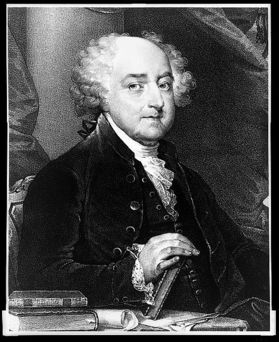John Adams: Difference between revisions
imported>Yi Zhe Wu |
imported>Yi Zhe Wu No edit summary |
||
| Line 1: | Line 1: | ||
[[Image:Johnadams.jpg|John Adams {{image|Gilbert Stuart}}|right|thumb|279px]] | [[Image:Johnadams.jpg|John Adams {{image|Gilbert Stuart}}|right|thumb|279px]] | ||
'''John Adams''' (1735-1826) was an early [[United States|American]] politician from [[Massachusetts]]. He was prominent figure in the [[American Revolution]] and one of the drafters of [[Declaration of Independence]]. After the enactment of the [[U.S. Constitution]], he was elected as the first Vice President of the United States under President [[George Washington]] and served from 1789 until 1797. | '''John Adams''' (1735-1826) was an early [[United States|American]] politician from [[Massachusetts]] and one of the most eminent members of the [[Adams political family]]. He was a prominent figure in the [[American Revolution]] and one of the drafters of [[Declaration of Independence]]. After the enactment of the [[U.S. Constitution]], he was elected as the first Vice President of the United States under President [[George Washington]] and served from 1789 until 1797. | ||
In the presidential election of 1796, Adams, on the ticket of the [[Federalist Party]], defeated the Democratic-Republican nominee [[Thomas Jefferson]] and became the second [[U.S. Presidents|President of the United States]]. He served until 1801, after he lost to Jefferson in a rematch. His presidency was marked by the quasi-war between the United States and [[France]], the [[XYZ Affair]], and the passage of [[Aliens and Sedition Acts]]. | In the presidential election of 1796, Adams, on the ticket of the [[Federalist Party]], defeated the Democratic-Republican nominee [[Thomas Jefferson]] and became the second [[U.S. Presidents|President of the United States]]. He served until 1801, after he lost to Jefferson in a rematch. His presidency was marked by the quasi-war between the United States and [[France]], the [[XYZ Affair]], and the passage of [[Aliens and Sedition Acts]]. | ||
Revision as of 11:28, 2 September 2007
John Adams (1735-1826) was an early American politician from Massachusetts and one of the most eminent members of the Adams political family. He was a prominent figure in the American Revolution and one of the drafters of Declaration of Independence. After the enactment of the U.S. Constitution, he was elected as the first Vice President of the United States under President George Washington and served from 1789 until 1797.
In the presidential election of 1796, Adams, on the ticket of the Federalist Party, defeated the Democratic-Republican nominee Thomas Jefferson and became the second President of the United States. He served until 1801, after he lost to Jefferson in a rematch. His presidency was marked by the quasi-war between the United States and France, the XYZ Affair, and the passage of Aliens and Sedition Acts.
He was a cousin of another revolutionary Samuel Adams, and father of the sixth U.S. president John Quincy Adams.
Early life
John Adams was born in Braintree, Massachusetts on October 19, 1735. He was educated at Harvard College and graduated in 1755. He then studied law, was admitted to the bar in 1758, and practiced law in Suffolk County.
Revolutionary activities
Adams was an opponent to the Stamp Act passed by the British Parliament and joined the Sons of Liberty. However, after the Boston Massacre of 1770, Adams served in defense of the British soldiers who conducted the shootings and six of them were acquitted as result. He was a delegate in both the First and the Second Continental Congresses. He also helped the drafting, and was a signer of the Declaration of Independence. During the Revolutionary War, he went to France and Holland as a diplomat and helped negotiate the peace treaty.
Vice President
Presidency
Supreme Court appointments
John Adams appointed three justices to the Supreme Court. They are Bushrod Washington, who was George Washington's nephew, Alfred Moore, and Chief Justice John Marshall, who was instrumental in initiating the process of judicial review.
